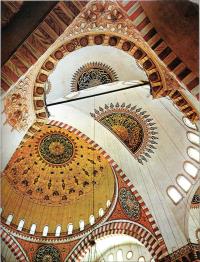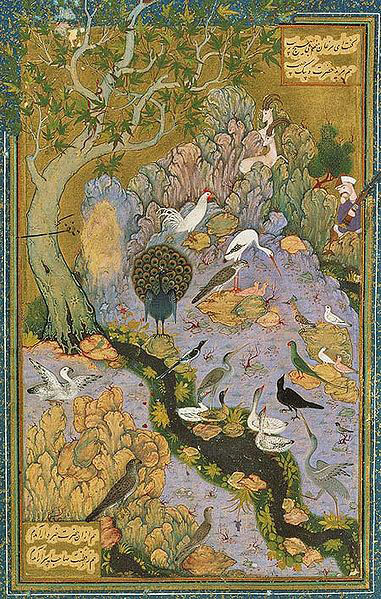Islam
Sufism
Origin of the Sunni - Chiite divide
Islam as a concept was founded in 610 with Mohammed's first message from Angel Gabriel. It is based on the belief that the Jews and the Christians had misunderstood the word of God so He chose the Arabs to be the true keepers of the monolithic faith. The first battles were to defend the Muslims’ right to exist but they soon became the occupiers. The purpose of the first four caliphates was to spread the belief of only one God. They were all close to the Prophet, respectfully called the Rashidun Caliphate (The Perfect). They are depicted as pious, sensible men who lived a simple lifestyle; Abu Bakr fasted every other day.
Mohammed had hoped Islam would unite the Arab people, instead his death ignited internal conflicts of interest which resulted in a schism between two quarreling parties. One group wanted Abu Bakr, Mohammed's father-in-law, to be calif (Sunni). Another group thought Mohammed's nephew Ali should replace his uncle (Chiite). From 632 to 661 all four were killed by assassins: Abu Bakr, Omar, Uthman and Ali.

Sufism
“Oh present that is absent when present! Oh, He who is hidden
by the abundance of light!” -Al Ghazali
Sufi philosophy emerged among the Chiite community in the 10th century as a literary and mystic movement similar to Gnosticism. In the 11th century it was most popular in Persia where the theologian, poet and philosopher Al Ghazali. The Church in Rome denounced Sufism labeling it a heresy (along with Gnosticism).
Sufism is a philosophy of light; an active, personal connection with a higher energy that is continuously renewed. Light is perceived because sometimes it’s there, and sometimes it’s not. If the world were to be continuously lit without shadows, in a way that is always identical, we would not be able to see anything.
Sufis were skeptical of traditional religion, where the faithful remain as children, ignorant, instead of becoming as children. They cannot gain life because they haven’t lost it. Sufis believe that mature spirituality requires more than faith. True meaning must come about as an achievement, which went completely against the cannons of the Church.
“When people cease to experience God, they are forced to believe in him.” - Jung
Farid ad-Din ‘Attar
‘Attar (born 1229 in Persia) is the most honored Sufi poet and was called Farid ad-Din, Pearl of Faith. In his The Conference of the Birds, he describes Sufi philosophy through parables. Symorgh, the name he uses for God means, in Farsi, Thirty Birds.
A group of a thousand birds, guided by a Hoopoe (a master), travel across Seven Valleys to find Symorgh. Each valley holds its own unique obstacle and many birds leave the group. Somewhat embarrassed for quitting the team they find excuses to justify their decision.
Only thirty birds reach the Gates. They'd lost everything (including their feathers). They’re tired, hungry and broken-hearted. Symorgh's guard sees the dirty, disenchanted birds, and orders them to leave.
They turn against the Hoopoe. “We’re afraid of death,” they say, and he replies, “Death is the rupture of time, and time is defined by our attachment to things that don’t last.” They reach a lake and looking down they see their reflection, individually and as a group. Suddenly they understand; what they are looking for lies within all of them as a whole.
Both Sunni and Chiite raced to become more powerful, forging territories by independently invading other lands and then invading each other. They found allies in the numerous nomadic tribes mistreated by local rulers, and formed large armies of strong soldiers used to the hardships of desert life. The shift in power from Medina to Damascus, the Umayyad capital city, was to have profound effects on the development of Islamic history. For one thing it was a tacit recognition of the end of an era. The first four califs had been without exception close Companions of the Prophet.
Wisely the Muslims kept the regional authorities in power and did not try to change people's habits. The Arab Muslims made a point of setting themselves apart in gated communities and citizens were taxed for not being Muslim, but they did not impose their religious beliefs and encouraged education. Islamic teaching quickly prevailed in the Middle East and North Africa. By the second half of Islamic expansion there were more non-Arab than Arab Muslims.
In the 11th century the Muslims’ growing strength outweighed the frictions between the Christian Church in Constantinople and Rome. After the foiled battle in Manzikert with the Seljuk Turks, Byzantine Emperor Alexius asked Pope Urban II in Rome for aid in defending Constantinople’s southern border. Urban eagerly engaged in a massive campaign to drum up interest for a "Holy Crusade" to fight the Muslims persecuting the Christians. European Kings and nobles adhered to the cause with the underlying agenda to regain Jerusalem and lands lost during the Muslim conquests.
Jerusalem was captured by the Crusaders in 1099, notwithstanding consistent squabbling amongst the nobility during the voyage. They torched the city after a three-day killing spree. Christian presence had become the biggest threat to stability in the Eastern Mediterranean.
Abbasid architecture

Symorgh speaks to them.
“The light of my presence is a mirror, and whoever comes into this light can see himself as a whole. Though you may be profoundly changed you can now contemplate the image of what you already were.”
It was in their reflection that they found the answer to the Mystery (of plurality and unity). It was inside them all along. They were each other and together they made One.